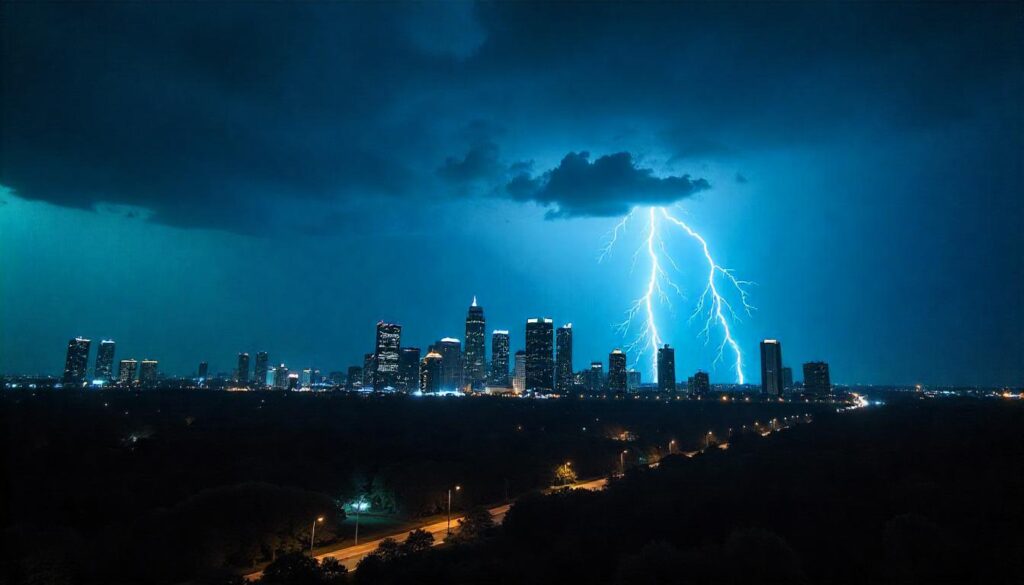
⚠ Tornado Warnings in Effect ⚠
Severe weather is impacting Atlanta and surrounding areas as tornado warnings have been issued. Residents are urged to take immediate safety precautions as the potential for dangerous conditions, including heavy winds and hail, remains high.
Stay Updated with Live Radar
Follow the latest developments with real-time updates on WSB-TV and 11Alive. Check live radar coverage for changes in your area’s forecast and monitor alerts to stay ahead of the storm.
Safety Tips During a Tornado Warning
- Seek Shelter Immediately: Go to a safe location, such as a basement or an interior room with no windows.
- Stay Away from Windows: Flying debris can cause injury or damage.
- Monitor Alerts: Tune into emergency channels like WSB-TV or 11Alive for the most up-to-date information.
- Prepare Your Emergency Kit: Include essentials such as water, flashlights, batteries, and a first-aid kit.
- Remain Indoors until authorities declare it is safe.
Be proactive and make your safety a priority. Stay informed through trusted sources as the situation unfolds. Stay safe, Atlanta! 🙏
Impact on Public Transportation
As a precautionary measure, MARTA has temporarily suspended all rail services until further notice. Bus services may also be impacted as roads become inaccessible due to severe weather conditions. Please plan accordingly and check for updates from MARTA before traveling.
School Closures
Several schools in the Atlanta metro area have announced closures for the day due to the tornado warnings. Parents are advised to stay updated on school closures and potential early dismissals through their local school district’s website or social media channels.
Possible Power Outages
With heavy winds and rain, power outages are a possibility during severe weather. If you experience a power outage, report
the issue to your electricity provider immediately. Georgia Power customers can report outages online or by calling their emergency hotline. Make sure to have flashlights, batteries, and any necessary backup power solutions readily available. Avoid using candles as they can pose a fire hazard.
Road and Traffic Conditions
Heavy rain, debris, and potential flooding may cause hazardous driving conditions across the Atlanta metro area. Avoid unnecessary travel during the storm and stay off the roads until conditions improve. Check traffic updates through the Georgia Department of Transportation (GDOT) or use navigation apps to monitor road closures and detours.
Community Resources
Local shelters are opening their doors for residents who may need a safe place to stay during the tornado warnings. Check with organizations like the American Red Cross, or contact your local government for a list of available shelters in your area. Additionally, neighbors are encouraged to check on each other, especially those who may require assistance during severe weather.
Stay vigilant, Atlanta, and put safety first. Together, we can weather this storm.
Recovery and Cleanup Efforts Post-Storm
As the severe weather subsides, recovery and cleanup efforts will begin across the affected areas. Residents are reminded to exercise caution when assessing damage to their homes or properties. Be on the lookout for downed power lines, fallen trees, and other hazards, and report these to emergency services promptly. Avoid wading through flooded areas, as they may contain hidden dangers such as sharp debris or electrical currents.
Volunteers and local organizations will play a crucial role in providing assistance to those most affected by the storm. The city of Atlanta will coordinate with disaster response teams to ensure resources are allocated to communities in need. If you’d like to lend a hand, consider reaching out to the American Red Cross or other local relief efforts to provide support through donations or volunteer work.
Residents are encouraged to document any storm-related damage for insurance purposes. Contact your insurance provider immediately to begin the claims process and ensure repairs can be handled quickly and efficiently. For structural concerns, only licensed professionals should perform repairs to maintain safety standards.
Patience and community cooperation will go a long way in helping Atlanta recover from this severe weather event. Stay strong and support your neighbors as the city works to rebuild and recover.
Mental Health Support After Severe Weather
Experiencing severe weather events like tornadoes can take a significant emotional toll on individuals and communities. It’s important to acknowledge feelings of stress, anxiety, or trauma that may arise in the aftermath. Local mental health resources are available to help residents cope with these challenges. Organizations such as the Georgia Crisis & Access Line (GCAL) and the American Red Cross offer counseling and support services to those in need.
Parents are encouraged to check in with their children, as weather-related emergencies can be particularly distressing for younger individuals. Open discussions about the experience and reassurance of safety can help alleviate fears.
Additionally, self-care practices like getting adequate sleep, staying connected with loved ones, and establishing routines can contribute to emotional well-being. Remember, reaching out for help is a sign of strength, and there is no shame in seeking professional support to process these experiences. Together, Atlanta can heal and emerge stronger.
Preparing for Future Severe Weather Events
While Atlanta works to recover from the current storm, preparing for future severe weather events is essential to minimize risk and ensure readiness. Residents are encouraged to create an emergency preparedness plan that includes vital details such as designated safe locations, evacuation routes, and emergency contact information. Share this plan with family members and practice it regularly.
Building an emergency supply kit is another critical step. Include at least three days’ worth of non-perishable food, water, medicine, and other essentials for all family members, including pets. Additional items such as a battery-powered radio, extra phone chargers, and important documents in a waterproof container can prove invaluable during emergency situations.
Stay informed by signing up for local alert systems, such as CodeRED or Wireless Emergency Alerts (WEA). These systems provide real-time updates on weather developments and safety instructions. Investing in a NOAA weather radio can also help ensure you receive updates even if power or cellular service is disrupted.
Finally, consider fortifying your home against severe weather. This may include installing storm shutters, reinforcing roofs, and anchoring outdoor items to prevent them from becoming projectiles during high winds. Consult with home improvement professionals for suitable options tailored to your property.
Proactive measures and preparedness can make all the difference during severe weather. By planning ahead, Atlanta residents can safeguard themselves, their loved ones, and their homes against future challenges.
Recognizing and Responding to Weather Alerts
Understanding and responding swiftly to weather alerts can save lives during severe weather events. The National Weather Service (NWS) issues various warnings and advisories to keep communities informed and prepared. It is crucial to recognize the difference between these alerts to take appropriate actions.
- Watch: A watch indicates that severe weather conditions, such as tornadoes or flash floods, are possible in your area. Stay alert, monitor updates, and ensure your emergency plan is ready to implement if needed.
- Warning: A warning means that severe weather has been observed or detected in your area. Immediate action should be taken to seek shelter and follow safety protocols, as this represents a more imminent threat.
- Advisory: This type of alert warns of less severe but still hazardous weather conditions that could impact daily activities. Exercise caution and stay informed on evolving conditions.
Residents should also familiarize themselves with specific local terminology or protocols that may apply to their area. Staying aware of the current weather situation and having a strategy in place will greatly enhance overall safety during times of heightened risk.
Remember, weather alerts are issued to protect lives and property, so never ignore them and prioritize safety above all else.
Community Resources for Recovery and Resilience

Recovering from severe weather events requires both individual efforts and the collective support of community resources. Numerous organizations and services are available to assist Atlanta residents in rebuilding and regaining a sense of stability. These resources can provide essentials such as shelter, food, financial assistance, and emotional support.
The Federal Emergency Management Agency (FEMA) plays a key role in disaster recovery by offering programs like Individual Assistance (IA) grants for uninsured property losses. Eligible residents are encouraged to apply through the official FEMA website or by visiting designated Disaster Recovery Centers (DRCs) in the community.
Local organizations such as the United Way of Greater Atlanta also provide aid through various programs, including housing assistance, utility support, and food distribution. Reach out to their 2-1-1 helpline for personalized guidance on available services.
Additionally, faith-based groups and local charities often mobilize quickly to address needs in the aftermath of severe weather. Churches, mosques, synagogues, and community centers often serve as shelters or distribution hubs for necessary items like food, water, and clothing.
Community-driven initiatives, such as neighborhood cleanup efforts and mutual aid groups, can also unite residents and forge stronger bonds. Volunteering or participating in these efforts is an excellent way to give back while fostering a sense of connection and resilience.
By leveraging available resources and coming together as a community, Atlanta can not only recover from this storm but also emerge more prepared to face challenges in the future. When we support each other, we strengthen the foundation for a brighter and more resilient tomorrow.
Mental Health Support Following Disasters
The aftermath of severe weather events can take a significant emotional toll on individuals and families. Stress, anxiety, and feelings of grief or loss are common reactions to such traumatic experiences. Recognizing the importance of mental health during recovery is vital, and several resources are available to help Atlanta residents cope.
Professional counseling and therapy services can provide much-needed support in processing emotions and building resilience. Local mental health providers, hospitals, or clinics may offer specialized programs for disaster recovery. Additionally, organizations such as the National Disaster Distress Helpline (1-800-985-5990) are available 24/7 to offer confidential support and connect individuals to qualified counselors.
For those who feel more comfortable in community-based settings, support groups provide a space to share experiences and receive empathy from others going through similar challenges. Faith-based communities and local nonprofit organizations often host or facilitate these gatherings.
Children may require personalized approaches to address changes in routines and emotions resulting from disasters. Parents and caregivers should monitor behavioral changes such as increased clinginess, sleep disturbances, or difficulty concentrating. Talk openly with children about the event at an age-appropriate level, reassure them of their safety, and seek professional help if needed.
Self-care practices also play a crucial role in mental health recovery. Engaging in mindfulness activities such as yoga, meditation, or journaling can help manage stress and promote a sense of calm. Similarly, prioritizing regular exercise, nutritious meals, and adequate sleep helps maintain overall well-being during difficult times.
Understanding that recovery is a gradual process and reaching out for support when needed can make the path forward less daunting. By caring for their mental health, Atlanta residents can strengthen their ability to heal individually and as a community.
